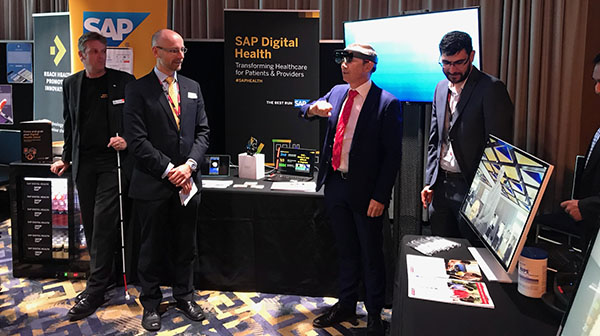From a stroke to a stroke of inspiration By Duncan Mitchell
My stroke occurred in July 2016. I was leading a busy life with three children, my beautiful wife and working as a Technology Solution Advisor. Stroke was the last thing on my mind.
My health was good, we live near the beach and as a keen squash player I spent a lot of time running around being physically active.
Then at the age of 49 I suffered a stroke. We believe it started on Thursday night after a squash match, but it wasn’t until the following Saturday morning my wife noticed my significant facial droop and called 000. If she had not recognised it was stroke and reacted immediately I don’t believe I would be alive, and my kids would be growing up without their Dad.
My stroke was caused by a dissection of the right ICA (carotid artery) and the CT scan showed the artery was completely blocked. It was decided it was too dangerous to operate, so I was put on a hemicraniectomy protocol for 72 hours.
For the next three days and nights I was observed hourly, there was concern my brain was swelling, and I would need a craniotomy to relieve the pressure. It was traumatic for all of us and I was keenly aware of how much the situation weighed on my wife and kids.
While lying in bed my smartwatch buzzed with my weekly Samsung Health report. Always keen to manage my heath, I had set it up months before. The irony was not lost on me, and I wished it had been able to notify me I was having a stroke. It would have saved three days.
Eventually the swelling in my brain subsided. I was left with left sided weakness, reduced cognitive functioning, neglect and vision issues (hemianopia). I started having daily physio and OT sessions at Charles Gardner Hospital and then at a rehab unit at Fiona Stanley.
Throughout this time an idea kept creeping back into my mind, what if I could create wearable technology like a smart watch which could alert people if they were having a stroke.
A stroke happens every 4 minutes (globally) and there are effective treatments available if you can get to hospital in time. How many lives could be saved and how many millions could avoid disability if they could be alerted to the danger of a stroke by a buzz on the wrist?
Finally, I returned to work in October 2017. I had been focused on my rehab for a year and I was pumped to get back to work. I wanted to find a way I could help people recognise a stroke through technology. I had a fire in my belly, and luckily, I wasn’t alone.
With the help of my team we got to work to make this idea a reality, and we were gaining the attention of possible investors. We won at the SAP 1 Billion Lives 2018 Regional Finals in Bangalore and were headed for the finals in Germany when I suffered a major seizure which set us back a bit.
I am happy to say we are now back on track and ‘Brain Games’ will be presented not only to SAP 1 Billion Lives Finals in 2019, but we’ve had the opportunity to present the concept to WA Minister for Health the Hon. Roger Cook MP.
I truly believe we’ll make Brain Games a reality and it is my mission in life to reduce death and disability caused by strokes. We are still some way off having a solution, but I’m confident we will be able to start trials later this year.

